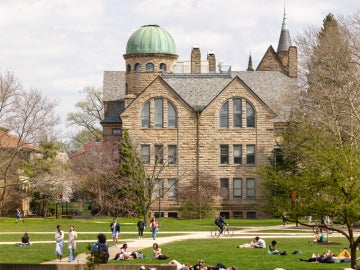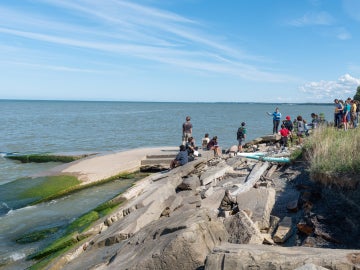Computer Science Seniors Look Toward Careers at Facebook
Minh Lam and Khang Nguyen land full-time positions as software engineers.
March 11, 2021
Jaimie Yue '22

Minh Lam and Khang Nguyen began development of their web app in 2018, and their team took the top prize in the 2020 LaunchU pitch competition.
Photo credit: Jack Lichtenstein '23
After a summer interning for Facebook, fourth-year computer science majors Minh Lam and Khang Nguyen Do Gia are preparing for full-time positions as software engineers with the social media platform.
Lam and Nguyen are originally from Ho Chi Minh City, Vietnam. Together with fourth-year Colton Potter and second-year Osama Abdelrahman, they won first place at the 2020 LaunchU pitch competition with their latest project, Twine.
LaunchU teaches participants what it takes to grow an idea into a sustainable business, non-profit or social enterprise that can change people’s lives.
Twine is a progressive web app that launched in fall 2020. Users can download Twine from a web browser onto their home screen, bypassing the App Store or Google Play entirely. Lam says that this design choice was intentional to further streamline the process.
“I think progressive web apps are the future,” Lam says. “You don’t have to go through Apple or Android, so that saves time for the developer, and it’s not platform-dependent for the users.”

Lam began development on Twine during Startup Weekend 2018, a program where students can bring their entrepreneurial ideas to life. Potter joined the team while groupmates with Lam in a computer science class project, followed by Nguyen and later Abdelrahman at LaunchU 2020.
Lam was encouraged to enter Twine into the 2020 LaunchU competition, and it won first place in the LaunchU pitch competition and $15,000. At the time, Lam and Nguyen were studying abroad in Germany and Hungary, respectively, so working on next steps involved a great deal of careful scheduling.
“We actually met in Budapest, Hungary, and we had to prepare for our presentation there,” Nguyen says, joking that the Twine team was working remotely before anyone else.
Shortly after, the COVID-19 pandemic forced many more people to work and study remotely, and the Twine team had to shift its goals for the app. One of the biggest changes was how to streamline Zoom events instead of on-campus events.
“When we first thought about how Twine would work, it would be a map-centered app,” Nguyen explains. “But then everything went online, which would not be helpful in our case. So we completely switched to another [interface] that concentrates more on Zoom links.”
“Instead of making the map a main feature, now we try to make it really easy for people to find the Zoom link,” Lam adds.
Overall, the team emphasizes accessibility, ease of use, and a streamlined and understandable interface on Twine. These goals are achieved through creating user profiles that recommend events by category based on the user’s preferences, similar to a streaming service such as Netflix.
“We have recommendations, and it’s a work in progress,” Lam says. “Recommendations are not easy. Big companies have whole teams or multiple teams that work on recommendations. But right now we’re trying our best to recommend things people will be interested in.”

Nguyen explains that the friend system is unique to Twine.
“We discussed that we want our app to be more social,” Nguyen says. “We noticed that we’re more likely to go to an event with friends, so we’re trying to develop our app so that friends can find ways to go to events with each other and also make friends by going to these events.”
While Nguyen noted the challenges of an all-remote internship, both students say their summer internship experience at Facebook was overall positive.
“The work experience was pretty amazing,” Lam says. “I talked with other people who got internships at smaller companies and even big techs, [and] it was more hit-or-miss than Facebook. My program was very clear in the things I had to do. There was a 10-week plan, what I should aim to achieve, and it was very clear what I was evaluated on. Also, my team was super easy to communicate with… So it was very collaborative.”
Khang and Nguyen both credit the invaluable network in Oberlin’s computer science department in helping them secure their positions at Facebook.
“A lot of our peers are very helpful. They [encourage] you to achieve something more,” Nguyen says. “It really motivated us and gave us the right tools to prepare us for the job market.”
“The other [computer science] majors are so good and helpful in so many ways,” Lam added. “Some people are really creative, and that really fostered a [positive] environment. Twine would have never happened if there weren’t creative people.”
Lam and Nguyen are in their last semester at Oberlin, but they are not finished with Twine. They have discussed plans to integrate the web app more fully into Oberlin and using that as a model to pitch to other colleges.
“We’re definitely looking to expand to other campuses,” Lam said. “I know Colton and Osama were in the process of talking with people at other schools. We’re really trying to build something that is useful [that] we can demonstrate in Oberlin so we can show it to people from other schools.”
To download Twine, users with an Oberlin email account can visit https://gettwine.app/begin on a mobile web browser. Students can also find the latest updates on Twine’s Instagram page, @twine.app.
You may also like…
Oberlin Launches Critical AI Studies Minor in Fall 2026
With a solid foundation in both science and the humanities, this minor ensures students to understand and be able to analyze the ethical, cultural, environmental, political, economic, technological, and labor effects of AI.
Research Roundup
Every day, Oberlin’s faculty and students produce scholarly work that uncovers new insights into how we understand the world, particularly in the areas of sustainability and the environment.
Three Things with Jillian Scudder
Oberlin’s astrophysicist-author shines a light on our dark universe.


